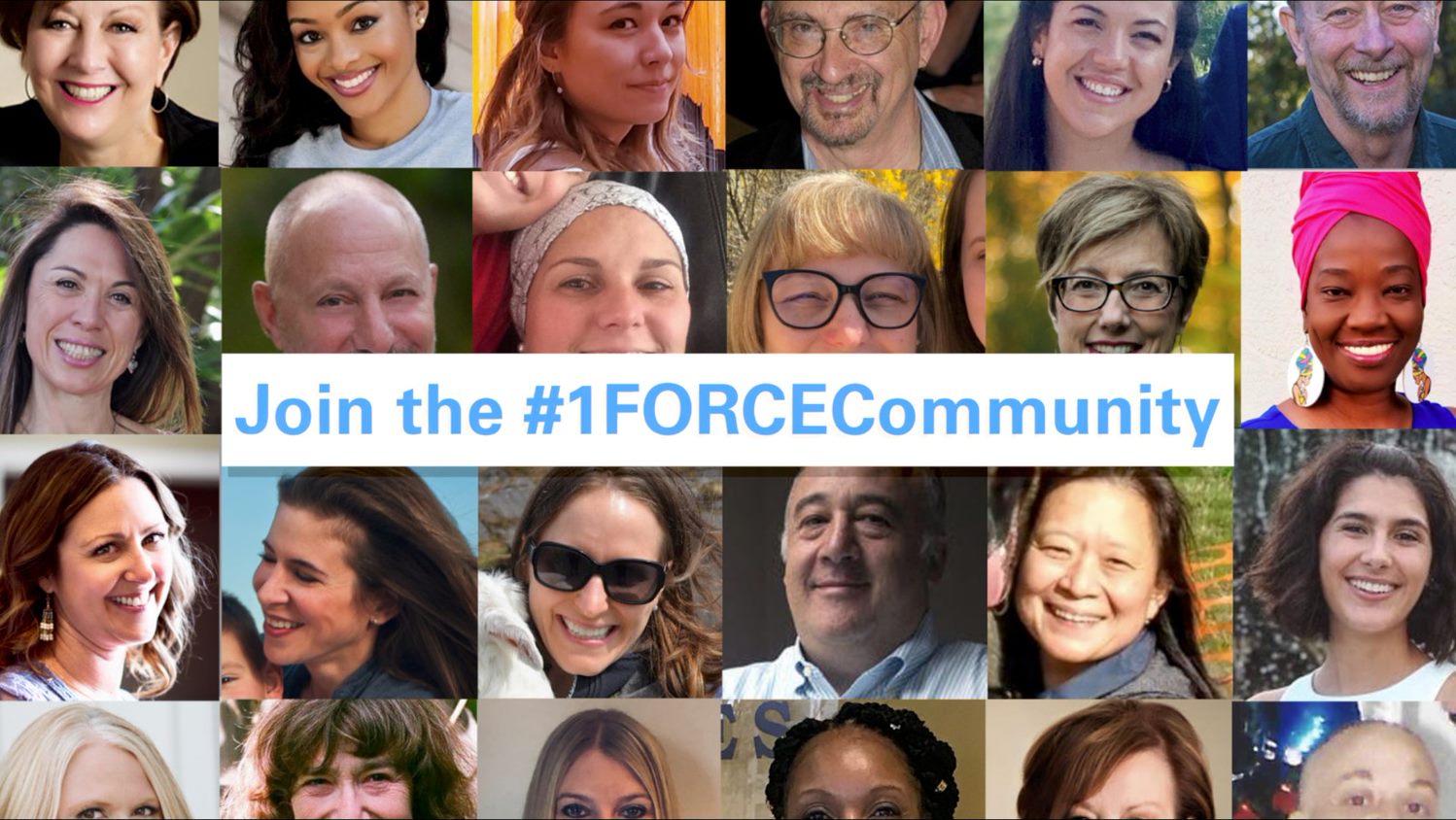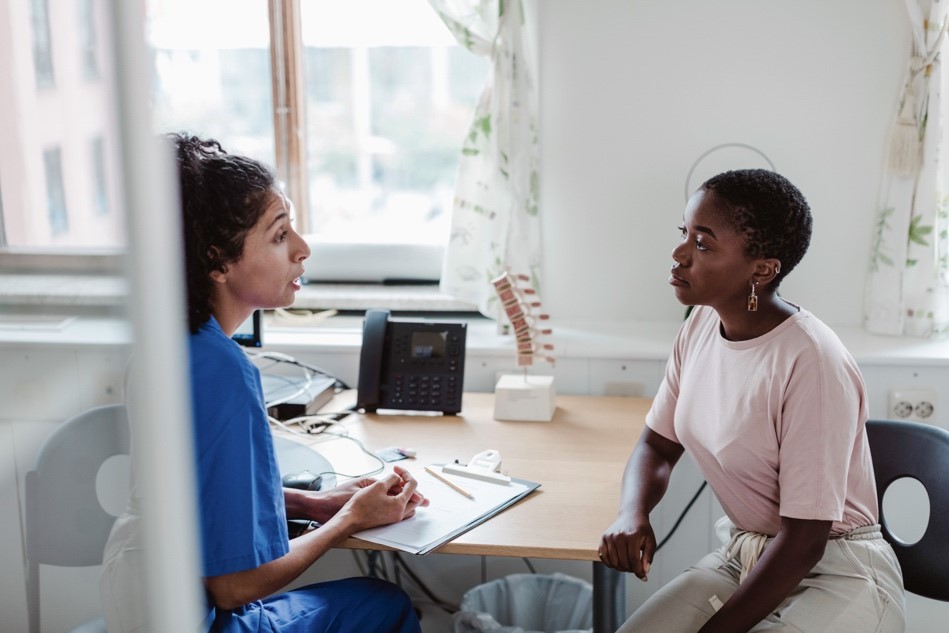Winter Healthcare Professional Updates
Dear Voornaam,
Read below for important updates for our healthcare professional subscribers.
|
| Resources for Many More of Your Patients
 By now you’ve heard that FORCE has expanded our mission to include those who face hereditary breast, colorectal, endometrial, ovarian, pancreatic and prostate cancers caused by an inherited mutation in a BRCA, ATM, PALB2, CHEK2, PTEN or other gene, as well as those associated with Lynch syndrome. Now we will educate, support and inform on behalf of so many more people. We hope you will share FORCE's information with all your patients who can benefit from our community. By now you’ve heard that FORCE has expanded our mission to include those who face hereditary breast, colorectal, endometrial, ovarian, pancreatic and prostate cancers caused by an inherited mutation in a BRCA, ATM, PALB2, CHEK2, PTEN or other gene, as well as those associated with Lynch syndrome. Now we will educate, support and inform on behalf of so many more people. We hope you will share FORCE's information with all your patients who can benefit from our community.
Order free brochures to share with patients
|
| Announcing the FORCE Spanish language portal and upcoming Spanish language webinars
 Please share information about our Spanish language portal and Spanish language webinars with your patients and colleagues. The FORCE Spanish language portal provides access to hereditary cancer news, research updates, information on upcoming and previously recorded Spanish language webinars, and conference news. The FORCE Spanish language portal and webinar series is sponsored by Susan G. Komen. Please share information about our Spanish language portal and Spanish language webinars with your patients and colleagues. The FORCE Spanish language portal provides access to hereditary cancer news, research updates, information on upcoming and previously recorded Spanish language webinars, and conference news. The FORCE Spanish language portal and webinar series is sponsored by Susan G. Komen.
Spanish language portal
|
| Virtual support meetings for your patients
 All of FORCE’s virtual support meetings are open to your patients to attend on Zoom from the comfort of their homes. Patients can select a date and time that works best for them to connect with peers and trained volunteers who understand the hereditary cancer decisions they face. They will be empowered with information, resources and support in a safe environment. All of FORCE’s virtual support meetings are open to your patients to attend on Zoom from the comfort of their homes. Patients can select a date and time that works best for them to connect with peers and trained volunteers who understand the hereditary cancer decisions they face. They will be empowered with information, resources and support in a safe environment.
View FORCE's upcoming meetings
|
| Spotlight on continuing education
 Highlighted below are three continuing education opportunities: Highlighted below are three continuing education opportunities:
- The 30th Annual Interdisciplinary Breast Center Conference. Hosted by the National Consortium of Breast Centers, this yearly conference brings together medical and industry experts to network and share ideas, methodologies and treatment options that improve quality of care and outcomes for patients diagnosed with breast diseases. This virtual conference will take place April 16-19, 2021.
- Let’s Talk: Nutrition, Physical Activity and Cancer Survivorship. This interactive training simulation from the American Cancer Society allows health care providers the opportunity to practice effective communication techniques for discussing nutrition, physical activity and obesity risk with cancer survivors. With support from the CDC, this training is available online through March 19, 2022.
- Direct-to-Consumer Genetic Testing 201: Technology, Complex Cases and Resources. Produced by the National Society of Genetic Counselors, this course provides an in-depth analysis of Direct-to-Consumer genetic testing by focusing on the different DTC products, challenges faced in the interpretation of results and tools for genetic counselors to help patients understand DTC results. Available online through December 30, 2022.
Click here for other CEU opportunities
|
| Giving voice to breast cancer patients' hormone therapy experience  Many patients with hormone receptor-positive breast cancer do not adhere to hormone therapy due to side effects. Read our XRAY-Behind the Breast Cancer Headlines review to hear the voices of patients’ experiences. Many patients with hormone receptor-positive breast cancer do not adhere to hormone therapy due to side effects. Read our XRAY-Behind the Breast Cancer Headlines review to hear the voices of patients’ experiences.
Read the XRAY article
|
| COVID-19 vaccine guidelines for cancer patients
 The National Comprehensive Cancer Network (NCCN) and the American Society of Clinical Oncology (ASCO) have issued COVID-19 vaccine guidelines for cancer patients. Read our XRAY-Behind the Cancer Headlines to learn more about these recommendations. The National Comprehensive Cancer Network (NCCN) and the American Society of Clinical Oncology (ASCO) have issued COVID-19 vaccine guidelines for cancer patients. Read our XRAY-Behind the Cancer Headlines to learn more about these recommendations.
Read the review
|
| FDA updates on breast implant-associated disease and illness  Breast implants have been linked to a very rare form of lymphoma as well as breast implant illness. Read our XRAY – Behind the Breast Cancer Headlines review on the latest update of cases and deaths of breast implant-associated anaplastic large cell lymphoma as well as cases of breast implant illness reported to the FDA. Breast implants have been linked to a very rare form of lymphoma as well as breast implant illness. Read our XRAY – Behind the Breast Cancer Headlines review on the latest update of cases and deaths of breast implant-associated anaplastic large cell lymphoma as well as cases of breast implant illness reported to the FDA.
Read the review
|
| New FORCE portal has resources for healthcare providers and researchers
 If you are a healthcare provider or researcher with a focus on hereditary cancer, our new portal page has links to continuing education opportunities, information on public policy issues, resources to share with patients and tools to help you engage more patients in your research. If you are a healthcare provider or researcher with a focus on hereditary cancer, our new portal page has links to continuing education opportunities, information on public policy issues, resources to share with patients and tools to help you engage more patients in your research.
|
| Clinical Trials and Research Studies Need Participants Help accelerate research by referring your patients to clinical trials We are promoting studies recruiting HBOC patients. Please share the studies listed below with your patients and visit our Featured Research Page for a list of other important research studies enrolling people affected by hereditary cancer.
|
Information and support needs of previvors  This research study (#1511) is a 15 to 20-minute survey regarding the information and support needs of previvors. Marleah Dean Kruzel, the principal investigator and professor at University of South Florida, is recruiting females over 18-years old, who have tested positive for a genetic mutation that increases their risk for hereditary cancer (or have a family history of carrying a genetic mutation) but have not been diagnosed with cancer, and select English as their language. Participants will receive a $10 electronic gift card. If you are interested in this opportunity, please contact Josephine, the Study Coordinator, at cancercomm@usf.edu. This research study (#1511) is a 15 to 20-minute survey regarding the information and support needs of previvors. Marleah Dean Kruzel, the principal investigator and professor at University of South Florida, is recruiting females over 18-years old, who have tested positive for a genetic mutation that increases their risk for hereditary cancer (or have a family history of carrying a genetic mutation) but have not been diagnosed with cancer, and select English as their language. Participants will receive a $10 electronic gift card. If you are interested in this opportunity, please contact Josephine, the Study Coordinator, at cancercomm@usf.edu.
|
Pain anxiety in cancer survivors  Are you a cancer survivor who received a cancer diagnosis at 18 years of age and older? If so, you may qualify to participate in the study "Pain Anxiety in Cancer Survivors”! You can participate by using your personal computer from home. We are investigating the relation of childhood adversity, pain, and fear of cancer recurrence. Participation involves completing a 15-minute computerized survey online from your home computer. No compensation is being offered for participation in this research study. Are you a cancer survivor who received a cancer diagnosis at 18 years of age and older? If so, you may qualify to participate in the study "Pain Anxiety in Cancer Survivors”! You can participate by using your personal computer from home. We are investigating the relation of childhood adversity, pain, and fear of cancer recurrence. Participation involves completing a 15-minute computerized survey online from your home computer. No compensation is being offered for participation in this research study.
Learn more
|
Talazoparib for people with metastatic breast cancer who have acquired (somatic) BRCA mutations  This study is enrolling individuals with metastatic breast cancer (triple-negative or hormone receptor positive, HER2 negative breast cancer) who have a BRCA1/2 mutation found in a liquid biopsy (cell-free DNA) but do not have a known inherited BRCA1/2 mutation to see if talazoparib is an effective treatment. This study is also using liquid biopsies to track treatment response and resistance. The study is open at Massachusetts General Hospital, and will also open soon at the University of California San Francisco and 5 other academic centers in the U.S. This study is enrolling individuals with metastatic breast cancer (triple-negative or hormone receptor positive, HER2 negative breast cancer) who have a BRCA1/2 mutation found in a liquid biopsy (cell-free DNA) but do not have a known inherited BRCA1/2 mutation to see if talazoparib is an effective treatment. This study is also using liquid biopsies to track treatment response and resistance. The study is open at Massachusetts General Hospital, and will also open soon at the University of California San Francisco and 5 other academic centers in the U.S.
Learn more
|
Genetic vaccine for the treatment of MSI-H colorectal, gastric and gastro-esophageal junction tumors  The goal of this cancer treatment study is to find the best dose and learn how safe and effective this cancer vaccine is for treating advanced colorectal, gastric and gastro-esophageal junction tumors that test positive for the biomarkers MSI-High or dMMR. The goal of this cancer treatment study is to find the best dose and learn how safe and effective this cancer vaccine is for treating advanced colorectal, gastric and gastro-esophageal junction tumors that test positive for the biomarkers MSI-High or dMMR.
Learn more
|
TALAPRO-2, a metastatic castration-resistant prostate cancer research study  Living with advanced prostate cancer can feel overwhelming. TALAPRO-2 is a clinical trial investigating a potential treatment for patients with metastatic castration-resistant prostate cancer (mCRPC) who have DNA damage repair (DDR) deficiency. To learn more, visit the TALAPRO-2 website. Living with advanced prostate cancer can feel overwhelming. TALAPRO-2 is a clinical trial investigating a potential treatment for patients with metastatic castration-resistant prostate cancer (mCRPC) who have DNA damage repair (DDR) deficiency. To learn more, visit the TALAPRO-2 website.
Learn more
|
SOROCk study for women with a BRCA1 mutation  Women with a BRCA1 mutation ages 35-50 at risk for ovarian cancer are eligible for the SOROCk study. SOROCk will determine if removal of the fallopian tubes alone can reduce the risk of ovarian cancer nearly as much as removing both the ovaries and fallopian tubes. Preserving the ovaries will prevent surgically-induced menopause. The study will also examine quality of life. Women with a BRCA1 mutation ages 35-50 at risk for ovarian cancer are eligible for the SOROCk study. SOROCk will determine if removal of the fallopian tubes alone can reduce the risk of ovarian cancer nearly as much as removing both the ovaries and fallopian tubes. Preserving the ovaries will prevent surgically-induced menopause. The study will also examine quality of life.
Learn more
|
Denosumab and mammographic density in premenopausal women with dense breasts
 This study is looking at the effect of denosumab on breast density of premenopausal women who have dense breasts. Denosumab is an FDA-approved medication for osteoporosis and to prevent fractures in cancer patients with bone metastases. This study could help identify new ways to prevent breast cancer in younger women. This study is looking at the effect of denosumab on breast density of premenopausal women who have dense breasts. Denosumab is an FDA-approved medication for osteoporosis and to prevent fractures in cancer patients with bone metastases. This study could help identify new ways to prevent breast cancer in younger women.
Learn more about this study
|
Study for people with unexpected genetic results
 Did you receive an unexpected genetic test result related to cancer risk? A new study is recruiting people who had genetic testing done for some other reason and received results related to their cancer risks. The goal of this study is to learn what people think about, and how they use results like this. Did you receive an unexpected genetic test result related to cancer risk? A new study is recruiting people who had genetic testing done for some other reason and received results related to their cancer risks. The goal of this study is to learn what people think about, and how they use results like this.
Learn more about this study
|
A study to evaluate Rucaparib in patients with solid tumors and with deleterious mutations in HRR genes (LODESTAR)
 The LODESTAR study is evaluating the response of the PARP inhibitor rucaparib in people with advanced solid tumors (including breast, ovarian, pancreatic, prostate and other cancers) who have an inherited or acquired mutation in any of the following genes: BRCA1, BRCA2, PALB2, RAD51C, RAD51D, BARD1, BRIP1, FANCA, NBN, RAD51 or RAD51B. The LODESTAR study is evaluating the response of the PARP inhibitor rucaparib in people with advanced solid tumors (including breast, ovarian, pancreatic, prostate and other cancers) who have an inherited or acquired mutation in any of the following genes: BRCA1, BRCA2, PALB2, RAD51C, RAD51D, BARD1, BRIP1, FANCA, NBN, RAD51 or RAD51B.
Learn more about LODESTAR
|
|  The PALB2 Study is an international research study looking to recruit women with PALB2 mutations who have been diagnosed with breast cancer. Research shows that PALB2 mutations increase the risk of developing breast cancer; however, it is not clear how to best treat or reduce the risk of breast cancer in women with PALB2 mutations. This research study collects information about breast cancer diagnosis and treatment using short questionnaires in order to learn more about breast cancer among women with a PALB2 mutation. This information will help to determine the best treatment for women with PALB2-associated breast cancer and determine which factors predict survival. Through a better understanding, we can personalize breast cancer treatment to increase survival and determine how to best manage at risk family members to detect cancer early or prevent it. For more information please email PALB2study@wchospital.ca. The PALB2 Study is an international research study looking to recruit women with PALB2 mutations who have been diagnosed with breast cancer. Research shows that PALB2 mutations increase the risk of developing breast cancer; however, it is not clear how to best treat or reduce the risk of breast cancer in women with PALB2 mutations. This research study collects information about breast cancer diagnosis and treatment using short questionnaires in order to learn more about breast cancer among women with a PALB2 mutation. This information will help to determine the best treatment for women with PALB2-associated breast cancer and determine which factors predict survival. Through a better understanding, we can personalize breast cancer treatment to increase survival and determine how to best manage at risk family members to detect cancer early or prevent it. For more information please email PALB2study@wchospital.ca.
|
| 
Do you have a genetic mutation increasing your risk of cancer? Help inform us how future research on lifestyle habits can better serve YOU! Take a 20-minutes survey to learn about nutrition and exercise in relationship to hereditary cancer mutations. Take the survey
|
| IMMray™ PanCan-d test for early detection of pancreatic cancer in high-risk groups

The Study of IMMray™ PanCan-d Test for Early Detection of Pancreatic Cancer in High-risk Groups is enrolling people who do not have pancreatic cancer, but have a higher risk of developing the disease. Learn more
|
Pilot study of denosumab in BRCA1 or BRCA2 mutation carriers scheduling risk-reducing Salpingo-Oophorectomy

Are you a BRCA1 or BRCA2 mutation carrier scheduled to have your fallopian tubes and ovaries removed? Learn about an opportunity to enroll in a clinical trial looking at the effects of denosumab on the ovaries, fallopian tubes, and uterus (for women getting a hysterectomy) of women with a BRCA1 or BRCA2 mutation. Denosumab is an FDA-approved injectable medication that is used to treat osteoporosis and to prevent fractures in cancer patients with bone metastases. The eventual goal is to understand if denosumab may be used to reduce the risk of ovarian cancer in women with a BRCA1 or BRCA2 mutation. Learn more
|
Screening for men at high genetic risk for prostate cancer

CALLING ALL MEN WITH A BRCA MUTATION, A LYNCH SYNDROME MUTATION or one of the other mutations listed below! The National Institutes of Health has a clinical trial for men at high genetic risk for prostate cancer. This is trial is for men without prostate cancer, ages 30 to 70, who have tested positive for Lynch syndrome (MLH1, MSH2, MSH6, PMS2, EPCAM) or BRCA1, BRCA2, HOXB13, ATM, NBN, TP53, BRIP1, CHEK2, PALB2, RAD51C, RAD51D, FANCA. The trial involves screening MRI of the prostate every two years and biopsy of the prostate if the MRI is abnormal. There is no cost for travel or study-related tests. Learn more about the study
|
A study in advanced breast cancer patients with BRCA 1/2 mutations evaluating olaparib alone or in combination with atezolizumab

This is a study for women or men who have been diagnosed with advanced breast cancer with a BRCA 1/2 mutation. The goal of this study is to look at whether giving the DNA damage repair inhibitor (PARP inhibitor) olaparib (Lynparza) in combination with the immunotherapy atezolizumab (Tecentriq) improves outcomes for patients compared to olaparib alone. Learn more about the study
|
| 
CheckMate-9KD is a clinical research study for men with metastatic prostate cancer (which means cancer that has spread) that no longer responds to treatments that lower testosterone. Visit the link below to learn more about the study. Learn more about CheckMate-9K
|
| Menopause and cognitive difficulty study

Did you know undergoing surgically or chemically induced menopause could put you at risk for cognitive difficulties? Our study seeks to determine the effectiveness of a stimulant drug called Vyvanse on the cognitive functioning of women who experience executive functioning difficulties following surgically induced menopause. For more information, please contact our team. Learn more about IMPRES
|
| GENTleMEN Study: genetic testing for men with metastatic prostate cancer

The goal of this research study is to determine if online genetic education and testing with online telephone genetic counseling is an acceptable method of delivering genetic testing to men with metastatic prostate cancer.
This study involves undergoing genetic counseling and genetic testing for inherited cancer risk.
Learn more about the study
|
| Athena- rucaparib and novolumab for maintenance in ovarian cancer

ATHENA is a study for women who are newly diagnosed with ovarian cancer. ATHENA is looking at whether maintenance therapy with a PARP inhibitor and/or immunotherapy improves outcomes for women who have completed front-line ovarian cancer treatment.
Learn more about ATHENA
|
| Genetic Education for Men (GEM) Study

The Genetic Education for Men (GEM) study, is a clinical trial evaluating educational tools for men from families in which a BRCA1/2 gene mutation has been identified. In order to identify untested men from BRCA1/2 families, we are seeking women who have received positive BRCA1/2 test results and have at least one untested male relative Learn more about the GEM Study
|
| ARIEL4- ovarian cancer

ARIEL4 is a treatment study for women with relapsed, high-grade epithelial ovarian, fallopian tube, or primary peritoneal cancer who have a BRCA1 or BRCA2 mutation. ARIEL4 is designed to evaluate rucaparib against standard of care chemotherapy in women who have had at least two prior chemotherapy regimens. Visit the ARIEL4 Study page for more information.
More information on ARIEL4
|
| Triton3- prostate cancer
 The purpose of TRITON3 is to determine how patients with metastatic castration-resistant prostate cancer, and an inherited BRCA1, BRCA2, or ATM gene mutation or tumor genetic deficiency respond to treatment with the PARP inhibitor rucaparib (Rubraca) compared to treatment with physician's choice of abiraterone acetate, enzalutamide, or docetaxel. The purpose of TRITON3 is to determine how patients with metastatic castration-resistant prostate cancer, and an inherited BRCA1, BRCA2, or ATM gene mutation or tumor genetic deficiency respond to treatment with the PARP inhibitor rucaparib (Rubraca) compared to treatment with physician's choice of abiraterone acetate, enzalutamide, or docetaxel.
More information on TRITON3
|
